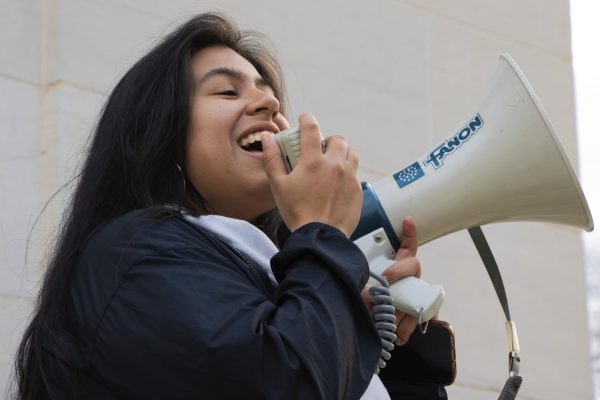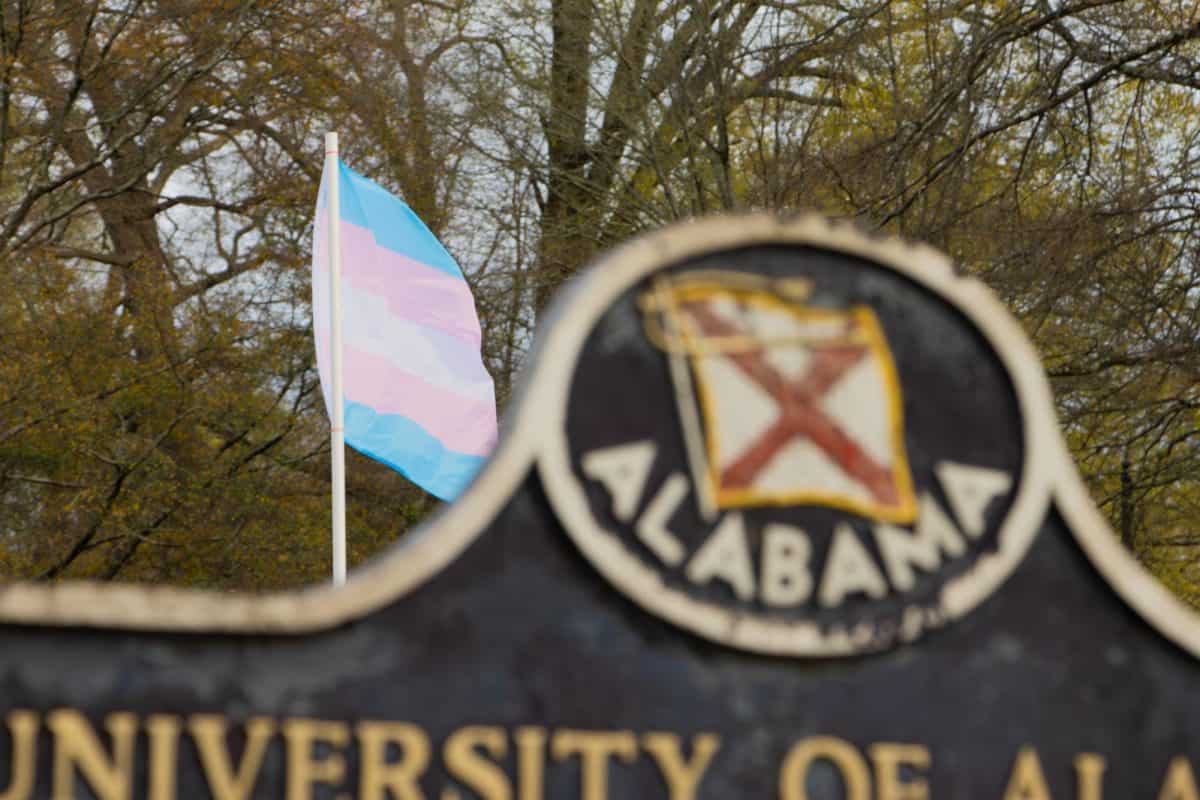It was three years in the making.
Gov. Kay Ivey signed Senate Bill 129 — which restricts funding for diversity, equity and inclusion programs and events at public universities — on March 20, three years after the original version of the bill hit roadblocks in the state House.
Now, UA students are feeling the changes while painting a picture of a university that has lacked clear communication.
Quiet funding changes
“It has totally and completely derailed the idea of what we thought would happen,” Julia Dominguez, president of the Hispanic-Latino Association, said of what she sees as the University’s lack of transparency.
Dominguez’s organization previously counted on funding from the University to host its annual La Gozadera event on Sept. 15 in celebration of Hispanic Heritage Month. Despite the fact that several funding avenues are no longer available to her, Dominguez was not informed of the changes until weeks before her event would take place.
On Aug. 7, Dominguez emailed Paige Acker-Price, director of University Programs, asking about receiving event resource funding and other support. Acker-Price responded Aug. 9 saying that applications for event resource requests were revamped and would reopen Aug. 21, but that this year, UP could not provide staffing support, as September events were already planned.
Dominguez wrote back Aug. 17 that the HLA more so needed funding for food at its event.
“La Gozadera has been an open event that attracts hundreds of students to celebrate Hispanic Heritage Month,” Dominguez said.
After the event resource requests were supposed to open, Dominguez clicked a link on the University’s website only to find that it was broken. After emailing Acker-Price again on Aug. 22, Dominguez was informed that recent changes to UP funding had occurred over the previous week and event resource funding no longer existed.
Acker-Price apologized for the “confusion” and said that “all funding for student organizations” would now come from the Student Government Association through the Financial Affairs Committee, which awards student organizations a maximum of $7,500 per school year with specific provisions for spending.
The FAC funding maximum for individual student organizations has not increased this year, although the University budgeted $70,000 more to the FAC to give to student organizations.

Due to the funding from UP being discontinued, the HLA has been forced to postpone La Gozadera.
“We were told, like, things aren’t going to change. We’re just going to change the name and it’s gonna be business as usual,” Dominguez said of messaging from the University in the weeks after SB129 was signed. “We all knew better. We knew that things were going to change. Nobody just wanted to acknowledge it.”
Dominguez did not learn until Sept. 20 that another grant previously offered by the Source for events jointly hosted by several student organizations no longer existed. She heard this while planning an event with other student organizations.
Webpages referencing the discontinued UP event resource grant and the collaborative grant still existed as of Monday night.
Alex House, assistant director of communications and media relations, did not say where funding for UP event grants would be reallocated, if at all, when asked.
The only formal campus-wide message the University has sent regarding specific compliance changes came July 23, when President Stuart Bell informed students that among other compliance changes, the division of DEI would be replaced.
“Additional details and guidance will be shared in the weeks ahead as we approach the Oct. 1 enforcement date,” Bell said.
Bell did not mention any other specific compliance changes, including those to student organization funding. However, the University seemingly knew about specific funding changes around this time.
Bryce Schottelkotte, president of the Queer Student Association, met with Steven Hood, vice president for student life, and other University staff in late July after Bell’s email was sent. She learned at this meeting that QSA could no longer get UP funding or event support for its “Shantay, UA!” event in August.
Schottelkotte said she appreciated University administrators being “proactive” in setting up this meeting and a similar one in April, which she said demonstrated that they “truly want to support the LGBTQ+ community” and all minority students.
House did not explicitly answer questions about why the University hasn’t informed the student body of compliance changes beyond the division of DEI closing.
“The Division of Student Life continues to work closely with SGA and student organizations to ensure funding procedures for student organizations comply with legal guidance, and staff are available to discuss specific questions an organization may have,” House said.
She added that the University is still undertaking a comprehensive review of campus programs, resources and initiatives to ensure compliance and that as noted in Bell’s email, some changes will take time.
Other student organizations not told about funding changes
The Indian Students Association of Tuscaloosa also found out about the removal of UP event resource funding after reaching out to UP and being told the funding no longer existed.
For the past several years, ISAT has hosted two major annual events, Diwali and Holi, which celebrate Indian culture while welcoming all students. Last year, the events attracted 700 and 500 people, respectively, and the total cost of both events usually exceeds $20,000.
“A lot of funding that we have usually relied on [has] closed down,” said Nethra Rajavel, vice president of ISAT, specifically citing the UP event resource and Source collaborative grants. “And this year, we are under the budget by a lot for Diwali.”
ISAT will celebrate Diwali Nov. 7, said Pratiksha Chaudhari, president of ISAT.
“We would have appreciated if we would have known before about closing these grants,” Chaudhari said. “We still have some time in our hand, and we are glad we get to know this … some time before the event.”

Asian American Student Association President Riya Patel — whose organization hosts a collaborative Lunar New Year event in the spring semester that attracted over 300 students last year — had not heard about any changes to UP funding before speaking with The Crimson White.
“It’s pretty upsetting to not get any information [and] just have to kind of figure out what’s not allowed now and what may not be given to use anymore by just hearing through word of mouth,” said Patel of funding used for the event. “We’re definitely going to have to scale down.”
Quiet removal of Safe Zone and Black Student Union office
The University quietly closed the Safe Zone Resource Center, which provided programming and a safe space for LGBTQ+ students, and shut down the Black Student Union’s office in the Student Center.
“I think that’ll leave a lot of people without a safe space,” said Shelby Johnson, president of the Black Faculty and Staff Association Ambassadors, of the impact of the BSU office’s removal and SB129 as a whole. “I think that’s going to leave a lot of people very vulnerable. And I think that just a lack of a space — it almost erases a lot of people.”

Like with funding changes, Schottlekotte was privately informed that the Safe Zone would be closing during her July meeting with University administrators, and she noted her appreciation for being given a chance to offer input on how the space could be reworked.
House previously said that the University met with student leaders whose organizations would be impacted by the closing of these spaces before the changes were finalized, but did not offer a specific reason why the student body was not informed of these changes.
“With the loss of the Safe Zone, so many LGBTQ+ students don’t even feel like there is a space for them anymore,” said Mia Massey, social media chairperson for QSA. The organization has since started holding study halls on Thursdays to make up for the loss of the Safe Zone.
“I feel like there wasn’t much support offered,” Massey said. “The campus [University] kind of let it happen, and there hasn’t been much to do anything providing a different resource,” adding that there are people like Hood who seem interested in supporting the QSA.
Looking forward
Uncertainty remains as students grapple with obstacles presented by ongoing compliance changes.
“What happened to our spaces? What happened to our events? Where is the defunding coming from?” Johnson said. “I don’t think that the University did a particularly [good] job in talking to the student body about these issues.”
When asked, House did not explicitly say whether the University committed itself to full transparency regarding SB129 compliance changes, including the specific lines of the law the University was citing for the changes.
To Dominguez, what she sees as a lack of transparency is telling.
She appreciated the work of some staff who have tried to keep HLA informed about compliances changes, but she said the University as a whole hasn’t been “willing or brave enough” to admit the changes and explain the reasoning for them.
Dominguez said that the fact that the University is preemptively making compliance changes despite the law not taking effect until Oct. 1 shows that the University’s actions are willful.
“I think it absolutely sends a message about priorities, especially to students of color, when you have the university telling students it’s all on them now to put on events that highlight those cultural differences,” she said in a text message. “I see it as essentially setting student orgs up to fail.”
Editor’s note: This story was updated the morning of Sept. 26 to correct an error regarding the HLA president’s last name, which was previously referred to as both “Dominguez” and “Hernandez.” Her last name is Dominguez, not Hernandez.















